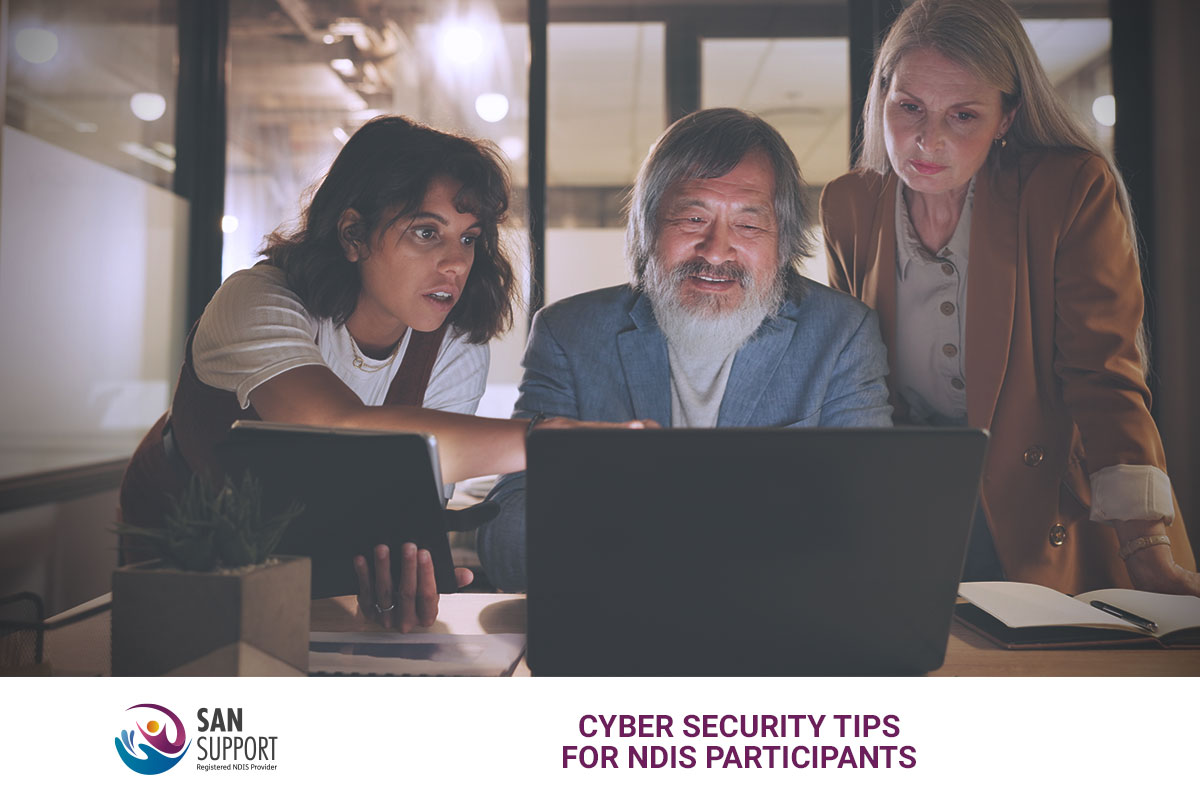
As an NDIS participant, you likely interact with several support coordinators, service providers and online platforms. While digital convenience makes managing your plan easier, it also increases your exposure to cyber security threats. That’s why following essential NDIS cyber security tips is crucial to keep your personal and plan information safe online.
Understanding how to stay safe online is critical for protecting your NDIS funding, personal data and peace of mind. Fortunately, you do not need to be a tech expert to stay secure. By building simple online safety habits, you can reduce the risk of falling victim to NDIS-related scams and fraud.
In this article, we will explore the most common online threats and share practical cyber security tips to help you protect your NDIS plan and personal information.
What Are the Cyber Risks for NDIS Participants?
Unfortunately, the same tools that make online interactions easier for NDIS participants also create opportunities for cyber criminals. Here are some of the most common threats you should be aware of:
Phishing Scams
Cyber criminals often send fake emails or text messages pretending to be from legitimate organisations like the NDIS, MyGov or Centrelink. These messages may ask for login details or personal information and often include links to fraudulent websites.
Data Breaches
If you reuse the same password across multiple accounts, a single breach could give hackers access to your email, banking information and NDIS dashboard. This can lead to unauthorised activity or identity theft.
Romance and Social Scams
Online support groups and forums can be great for connection but are also targeted by scammers. These individuals may pretend to be friends or romantic interests and eventually ask for money or sensitive information.
Now that you understand the risks, let’s explore how to protect your NDIS information online.
Essential Cybersecurity Tips for NDIS Participants
Keep Your Personal Information Secure
Protecting your personal information is the foundation of NDIS cybersecurity. Always:
- Use unique passwords for different accounts
- Activate two-factor authentication (2FA) where available
- Avoid storing passwords on shared devices or browsers
- Keep your device locked and protected by a passcode
Many phones store logins automatically. If someone gains access to your device, they can potentially access your NDIS portal, emails and financial apps. Therefore, limit access to your device and log out when not in use.
Verify Before You Click or Pay
Before paying invoices or clicking links in emails or texts, double-check the source. NDIS scams often appear very professional but contain small inconsistencies.
Here’s what to do:
- Inspect the sender’s email address or phone number
- Look out for poor grammar, strange formatting or unusual tone
- Avoid clicking on links in unexpected messages
- If unsure, visit the organisation’s official website or contact them directly
If you suspect you have paid a fake invoice, contact your bank immediately to request a reversal.
Check and Update Your Consent List
Regularly review who has access to your NDIS participant information. You may have previously given consent to a carer, family member or support worker. If your situation has changed, it is important to update those records.
Also, ensure your mobile number and email address are current with the NDIA so you receive important updates and alerts directly.
Monitor Your NDIS Plan and Budget
Keeping a close eye on your NDIS budget is a simple yet powerful way to spot unauthorised transactions. You should regularly:
- Review your spending and invoice history
- Flag any services you did not receive
- Look out for duplicate claims or incorrect charges
Using NDIS plan management can make this easier. A plan manager monitors your invoices, checks for errors and submits claims on your behalf. This reduces the risk of non-compliance and ensures your funds are being used properly.
Trust Your Instincts
Scammers often use fear and urgency to get people to act quickly. If something feels wrong, it is okay to pause and investigate. Never feel pressured to provide personal information, especially during unexpected calls, messages or emails.
If you are ever in doubt, speak with someone you trust or contact the relevant agency directly.
What to Do If You Suspect Fraud or a Scam
If you believe someone is misusing your NDIS funds or pretending to be an NDIS provider or representative, take action immediately:
- Report NDIS-related fraud by calling 1800 650 717 or emailing fraudreporting@ndis.gov.au
- Change your passwords on all affected accounts
- Enable two-factor authentication for added protection
Acting early can help prevent further loss or damage to your accounts.
Fraud vs. Non-Compliance: Know the Difference
Understanding the difference between fraud and non-compliance is essential for protecting your plan:
- Fraud is a criminal offence. It involves deliberate actions like submitting false invoices or misusing another person’s NDIS funds.
- Non-compliance refers to unintentional rule-breaking, such as incorrect claiming or failing to report a conflict of interest.
Both require attention. Report any concerns to the NDIA as soon as possible so they can investigate and take appropriate steps.
How Plan Management Enhances Online Safety
If you find it difficult to stay on top of your NDIS budget, invoices and service providers, plan management can help. A plan manager:
- Reviews and verifies every invoice
- Ensures claims match your plan’s funding categories
- Alerts you to suspicious or duplicate charges
- Keeps your financial records safe and organised
By adding this extra layer of security, plan management like SAN Support helps reduce the risk of errors, fraud and non-compliance giving you greater peace of mind.
Final Thoughts
Staying safe online as an NDIS participant does not need to be overwhelming. With the right habits and awareness, you can confidently protect your information and make the most of your NDIS plan.
Remember to secure your accounts, check before you click, monitor your budget and report anything suspicious. These simple steps can make a big difference. If you need help managing your plan, working with a registered NDIS plan management provider can add another layer of support and protection.
